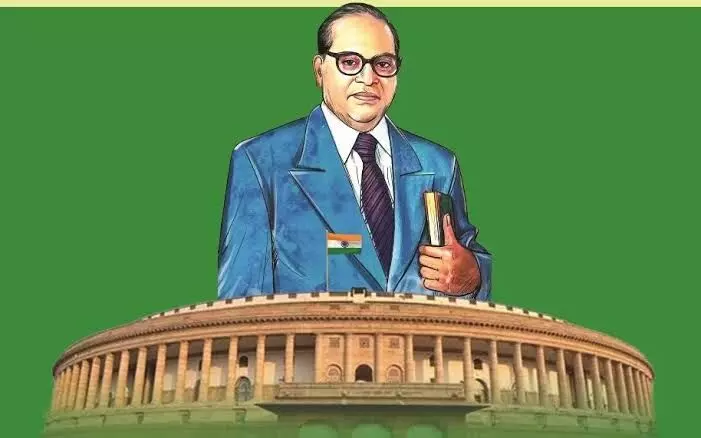Ambedkar’s Vision and the Misappropriation of His Legacy: A Reflection on Social Harmony

Recently, the Congress Party has attempted to garner attention by politicizing statements and misinforming the public, as shown by the latest issues revolving around Amit Shah ji's remarks. This has become a component of a comprehensive plan to construct a narrative about the Constitution and Dr. B.R. Ambedkar, positioning themselves as guardians of his vision. This narrative conveniently disregards the Congress's previous mistakes, including its persistent marginalization of Ambedkar, the imposition of the Emergency, and its inadequate efforts to empower oppressed people.
Contrastingly, the BJP-led NDA government has implemented concrete efforts to commemorate Ambedkar’s legacy and ideals. Initiatives such as the establishment of the Panch Tirths—five pilgrimage sites linked to Ambedkar’s life—and the assurance that Dalits have their just share in welfare programs demonstrate a dedication to empowerment rather than mere tokenism. It is essential to fight the Congress's attempts by reminding people of Ambedkar's staunch criticism of this party during his lifetime.
Recent political discourses have seen a contentious misappropriation of Babasaheb's legacy, especially by the Congress Party, which seeks to associate itself with his vision while conveniently disregarding its sharp critique Ambedkar presented in his seminal work, "What Congress and Gandhi have done to the Untouchables." He was categorical in his evaluation that the Congress Party, whatever its assertions, was never really representative of the Scheduled Caste community. In his works, he said that the party mostly served the interests of an elite class and neglected to confront the structural disparities and systematic oppression experienced by Dalits and other oppressed people.
Ambedkar said, “The Congress has been loudly and insistently claiming that it is the only political organization in India which is representative of the people of India. This it does not now do, at any rate not so loudly and insistently. But so far as the Untouchables are concerned the Congress maintains most vehemently that it does represent them. On the other hand, the non-Congress political parties have always denied this claim. This is particularly true of the Untouchables who have never hesitated to repudiate the Congress claim to represent them.”(146, Chapter VI, A False Claim, What Congress and Gandhi have done to the Untouchables)
Ambedkar emphasized how the Congress used its extensive resources in advertising and propaganda to promote itself as the only representation of all Indians, including the Scheduled Caste population. Nevertheless, as Ambedkar said, the elections of 1937 provided a sobering assessment. Notwithstanding its substantial resources, prominence, and popular support, the Congress was unable to obtain even fifty percent of the seats or votes. Ambedkar highlighted the lopsided voting against the Congress, indicating that of 1,586,456 votes, just 290,737 (18%) were in support of Congress candidates, while 82% were allocated to other candidates. He said, “Can there be any evidence more conclusive against the Congress claim to represent the Untouchables?”(186, Chapter VI, A False Claim, What Congress and Gandhi have done to the Untouchables)
Ambedkar's attacks were not limited to abstract language; they exposed the emptiness of Congress's assertions and its failure to authentically address the demands of the Scheduled Caste group. The Congress's appropriation of his memory in current politics is especially unwarranted when contrasted with these incisive observations. Today, the Congress positions itself as a guardian of Ambedkar's principles, often using his name and contributions to condemn the policies of the governing Bharatiya Janata Party (BJP). This narrative overlooks the historical record, whereby Ambedkar often emphasized the Congress's inability to really include the Scheduled Caste community into the national movement or provide them with meaningful empowerment.
The BJP has attempted to connect with Ambedkar's legacy by highlighting his contributions to nation-building, constitutionalism, and social change. Efforts to honor Ambedkar’s legacy and policies focused on Dalit welfare demonstrate an endeavor to conform to his ideals of societal peace and fairness.
This leads us to a pivotal inquiry: Is it possible to attain social harmony by leveraging a thinker's legacy while disregarding the core of his critique? The solution is in a sincere engagement with Ambedkar’s concepts, recognizing historical shortcomings, and crafting policies that eradicate caste structures and foster genuine inclusion. Ambedkar's conception of social harmony focused on structural change rather than just symbolic gestures.
By reexamining Ambedkar’s criticisms of the Congress and juxtaposing them with current political narratives, we can reveal the discrepancies between rhetoric and reality. This process is essential, not just for commemorating Ambedkar’s legacy but also for defining a trajectory towards the social harmony he envisioned.
Dr. Rounak Kumar Pathak
Assistant Professor
Sri Aurobindo College(Morning)
University of Delhi
